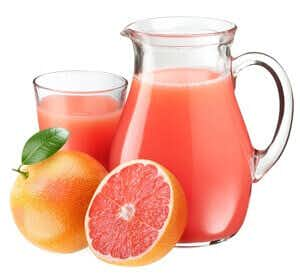
Everyone is in a hurry these days. This is especially true when it comes to prescriptions. Many doctors don’t even hand you a paper prescription; they just transmit it electronically from their computer or smart phone directly to the pharmacy.
If you hang out at the pharmacy for a few minutes, you will discover that most people grab and go as soon as they swipe their card. Rarely do patients take time to find out how to take their medicine by asking detailed questions of their physician or pharmacist.
The trouble with this rush-rush approach to medications is that people may not learn how foods could affect their pills. Grapefruit offers the best-known examples of potentially dangerous drug-food interactions.
A recent article in the Canadian Medical Association Journal (online, Nov. 26, 2012) reveals that 85 different drugs might be incompatible with grapefruit. We first learned about this unusual interaction in 1991 (Lancet, Feb. 2, 1991). Researchers in Canada were testing the blood pressure pill felodipine (Plendil) and discovered quite by accident that grapefruit juice tripled the amount of felodipine in the blood compared to water or orange juice. The increased blood levels led to symptoms such as headaches, lightheadedness and flushing.
At first, many health professionals found this idea laughable. But when problems arose with other medications such as the transplant drug cyclosporine (Neoral, Sandimmune) and cholesterol-lowering drugs such as atorvastatin (Lipitor) and simvastatin (Zocor), they had to take grapefruit incompatibilities seriously.
Grapefruit compounds slow down enzymes (CYP3A4) in the lining of the intestine that normally process the drugs and speed them on their way. This can lead to elevated levels of medicines and cause unintentional overdosing.
Medications that are affected include the blood pressure pill nifedipine, the anti-cancer medicine docetaxel (Taxotere) and the narcotic pain reliever oxycodone. People who would like to know more about this topic may be interested in our Guides to Food, Drug and Grapefruit Interactions.
Grapefruit is not the only problem. Taking aliskiren (Tekturna) to lower blood pressure with apple juice may reduce the blood levels significantly and reduce the effectiveness of the medicine.
Levothyroxine used to treat a sluggish thyroid gland can be affected by calcium, iron and magnesium. Multivitamins and juices that are fortified with calcium may interfere with the absorption of this hormone as well as several antibiotics (ciprofloxacin, norfloxacin and tetracycline).
Even the amount of water you swallow when taking your pills may matter. The antibiotics erythromycin and amoxicillin work best when swallowed with a full 8 ounces of water. That’s why it makes sense to get explicit instructions any time you are given a prescription.

